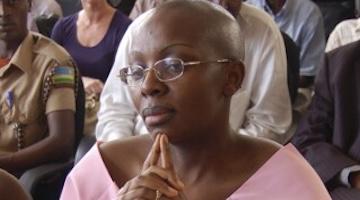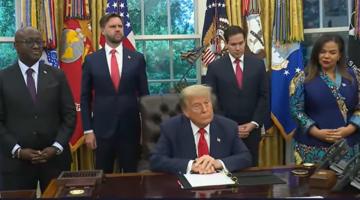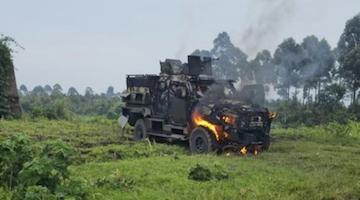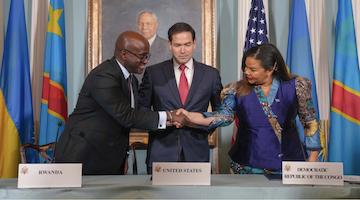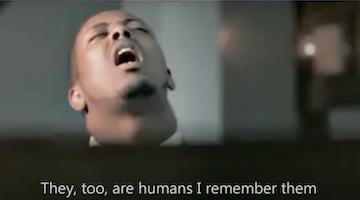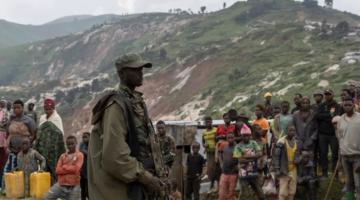Paul Rusesabagina is free after being kidnapped and taken to Rwanda in 2020. The US claims credit for pressuring Rwanda to release him, hoping to distract the world from its decades of support for President Paul Kagame and his human rights crimes in Rwanda and neighboring Democratic Republic of Congo.
This week a headline in the East African read "US gets Kigali to toe the line again" till it was changed to the less paternalistic “Friends again: US, Rwanda patch fragile ties after Rusesabagina freed.”
We should all be glad to see Paul Rusesabagina free, back home in San Antonio, but ties between the US and Rwanda haven’t been fragile since Rwandan dictator Paul Kagame seized power in Kigali in 1994. The US is simply using Rusesabagina’s release to whitewash its ongoing, decades-long partnership with Kagame as he brutally represses his own people and invades, occupies, and plunders the Democratic Republic of the Congo (DRC).
There was a bit of a hiccup in the relationship when, in 2020, Kagame had Rusesabagina kidnapped in Qatar and flown to Rwanda while Rusesabagina thought he was flying to Burundi. It was bad press, but that’s all. Ultimately it gave Antony Blinken a chance to do some grandstanding during his last visit to Africa and upon Rusesabagina’s release.
The US has been hand-in-glove with Kagame since 1990, when he invaded Rwanda with a band of aristocratic Tutsi exiles whose parents had fled the revolution that ended the Tutsi monarchy in 1961. The ensuing four-year war that toppled the majority Hutu government included the infamous massacres that came to be known as the Rwandan Genocide, which were wrongly characterized as the massacre of hundreds of thousands of primarily Tutsis. As Judi Rever demonstrated in her groundbreaking book, “In Praise of Blood: Crimes of the Rwandan Patriotic,” hundreds of thousands of the majority Hutu population, even more than the minority Tutsis, died in the tragic bloodletting.
Then, with US backing, Rwanda invaded DRC, which was then Zaire, overthrowing its president, and displacing France as the dominant power in the region, as was recounted in the 1997 Newsweek report “Washington’s Africa Move.”
Kagame clearly wasn’t happy about releasing Rusesabagina. He had even gone so far as to recruit Minnesota Congresswoman Ilhan Omar to lobby for keeping him in captivity, after flying her to Rwanda on a PR junket. In February 2022, Omar said she would vote against House Resolution 892, which called for Rusesabagina’s release. Ultimately the resolution passed overwhelmingly, 418 to 8 with 9, including Omar, not voting.
In the end, freeing Rusesabagina was a price Kagame had to pay to sustain his strategic partnership with the US.
Friends of the Congo’s Executive Director Maurice Carney responded, “If you were to follow the behind the scenes negotiations between the US and Rwanda regarding the release of Rusesabagina, it would become evident that part of the deal, although unstated, is that the US would give Rwanda more latitude in its incursion in eastern DRC. The US tacit message was ‘Release Rusesabagina and do as you wish in eastern DRC.’”
Rusesabagina Is a Safe Save for the US
Paul Rusesabagina is the real life hero of the 2004 film Hotel Rwanda, the hotel manager who saved the lives of over 1200 Tutsis by sheltering them in the Hotel Milles Collines while the interahamwe militia massacred innocent Tutsis in the streets of Rwanda’s capital, Kigali. Rusesabagina is no doubt the hero who saved all these people, but the movie tells a simple, Manichean tale in which good triumphs over evil. Demon Hutus kill innocent Tutsis but one man, one heroic Hutu, saves 1200 of them.
Rusesabagina became the archetype of the “moderate Hutu” in this story, also entrenched in the Wikipedia, which reads: “During this period of around 100 days, members of the Tutsi minority ethnic group, as well as some moderate Hutu and Twa, were killed by armed Hutu militias. The most widely accepted scholarly estimates are around 500,000 to 662,000 Tutsi deaths.”
This story is as firmly entrenched by the film Hotel Rwanda, which tells the same simple story and has had huge propaganda value for US foreign policy, the genocide industrial complex, and the argument for intervention to stop genocide.
For many years, during the Save Darfur Movement, the movie rental opened on actor Don Cheadle, who played Rusesabagina, warning the audience that the story they were about to see was being repeated north of Rwanda, in Sudan. That movement rallied hundreds of churches, youth groups, and NGOs to stop genocide in Sudan and gave birth to STAND, “the student-led movement to end mass atrocities,” which continues to rally college students to the cause of “humanitarian intervention,” a guise for US hybrid warfare.
However, by 2007, Paul Rusesabagina’s own understanding of what had happened in 1994 had evolved well beyond the simple Manichean story told in the movie. That year, he wrote this eloquent letter to then Secretary General Ban-Ki-moon about the gross injustice being perpetrated by the International Criminal Tribunal on Rwanda, and cc’ed it to some of the world’s most powerful officials:
Paul Rusesabagina Brussels, June 20, 2007
124 Avenue Baron Albert d’Huart
1950 Kraainem, Belgique
His Excellency Ban Ki-moon
UN Secretary General, ROOM 3800
United Nations Headquarters
New York, NW 10017
Subject : RWANDA: the need to extend the ICTR’s current term beyond the December 31, 2008 deadline
Mr. Secretary General:
Even as the ICTR’s detailed plan to end all court proceedings in 2008 and close all cases in 2010 is under consideration for approval by the UN Security Council, I have the honor, on behalf of millions of voiceless Rwandans thirsting for justice, to request your high authority to grant a term extension for the Arusha-based ICTR beyond its December 31, 2008 deadline.
Some 13 years after its inception, the ICTR in Arusha has fallen well short of its initial mission as assigned by the UN Security Council. UN Security Council Resolution 955 creating the ICTR clearly stated that the Tribunal’s goal was to “prosecute all persons guilty of the crime of genocide and other serious violations of international humanitarian law on Rwandan territory, and Rwandan citizens guilty of the crime of genocide and similar crimes in neighboring countries between January 1 and December 31, 1994” (ICTR Statute as adopted by UN Security Council Resolution S/RES/955 (1994) of 8 November 1994). The resolution resulted from the findings of a UN Secretary General Expert Commission which stated that “elements from both warring camps had committed serious violations of international humanitarian law as well as crimes against humanity” (The United Nations and Rwanda, 1993-1996, p.64). And yet, up until now, it is all too clear that the ICTR has only prosecuted members of one side to the conflict at the time, namely the former government and the former Rwandan armed forces (FAR), granting total enjoyment of impunity to members of the Rwandan Patriotic Front (RPF) and its army the Rwandan Patriotic Army (RPA). Not that there has been any kind of amendment to the original Resolution 955 allowing the ICTR to close its eyes on the RPF crimes. Quite the contrary. All subsequent ICTR resolutions, some of which have even specifically cited the RPF by name, have invariably stressed the need to prosecute all criminals without exception. One example is resolution 1503 of 28 August 2003, which “urges all States, especially Rwanda, Kenya, the Democratic Republic of Congo, and the Republic of Congo, to increase cooperation with the ICTR and provide necessary assistance, particularly as regards the Rwandan Patriotic Army…”.
To date, the ICTR has also failed to identify and prosecute perpetrators of the April 6, 1994 airplane terrorist attack that took the lives of Presidents Juvenal Habyarimana of Rwanda and Cyprian Ntaryamira of Burundi, and set in motion the crime of genocide, the crimes against humanity, and unspeakable crimes of war in Rwanda in 1994. In light of the recent Security Council Resolution 1757 on May 30, 2007, creating a Special International Tribunal for Lebanon to try suspected perpetrators in the bombing that killed former Prime Minister Rafik Hariri, it would appear unbecoming if the ICTR chose to overlook the April 6, 1994 airplane attack. It would be telling the world that the lives of 2 African Heads of State, even after their killing precipitated the immediate death of more than one million innocent Rwandans, have far less value than that of a former Lebanese Prime Minister. Unfortunately, the stance of current ICTR Prosecutor Hassan Bubacar Jallow that the April 6, 1994 airplane attack is not part of the tribunal’s mandate, runs counter to that of two of his predecessors, namely Richard Goldstone[1] and Carla Del Ponte[2], and risks driving the ICTR to that shameful conclusion.
Mr. Secretary General, if the ICTR goes ahead and concludes all proceedings on December 31, 2008 without prosecuting suspected criminals within the RPF, it will have contributed to compounding the Rwandan problem rather than solving it, because it will have served to entrench the very pattern of discrimination it had been destined to stamp out. It will also have betrayed all those left in deep grief by the killers within the RPF and who, like myself, had at one time believed in its justice system. Last November, I formally lodged with the ICTR a detailed complaint against the RPF for its horrible crimes against the Rwandan people and members of my family, but I am still impatiently waiting for justice to be served. In addition, the ICTR will have robbed the Rwandan people of the possibility of laying the foundations of genuine reconciliation, unlike the ICTY which not only endeavors to punish war criminals equitably among Serbs, Croats and Bosnians alike, but most importantly never allows either of the former belligerents to be judge and jury as the ICTR is trying to do by transferring cases to Rwanda. In the end, it will have only served to set all of humanity backwards in its noble fight against impunity and discrimination.
Truthfully, unless all criminals guilty of the worst kind of crimes against humanity are punished, there is no hope for genuine reconciliation among Rwandans. That is the overriding conviction among Rwandans, which also happens to be the position defended staunchly, and rightly so, by many specialists of the Great Lakes region of Africa, such as Professor Filip Reyntjens of Antwerp University in Belgium, who has terminated all collaboration with the ICTR for as long as no one within the RPF is indicted[3]. It is also the position defended by some of the well regarded human rights organizations, namely Amnesty International and Human Rights Watch.
Mr. Secretary General, I insistently urge you to take all these great concerns into full consideration, and to extend beyond the December 31, 2008 deadline the term of the ICTR in Arusha, for the greater good of the Rwandan people, present and future.
Respectfully,
Paul Rusesabagina
CC:
UN Security Council Members (all)
His Excellency John Kufuor, African Union President
Her Excellency Angela Merkel, European Union President
Mr. Guy Verhofstadt, Prime Minister of Belgium
Mr. Dennys Byron, President of the ICTR
Mr. Hassan Jallow, General Prosecutor of the ICTR
His Holiness Pope Benedict XVI
His Excellency Nelson Mandela
The Honorable Nancy Pelosi, Madam Speaker of US Congress
Amnesty International
Human Rights Watch
[1] According to Agence Hirondelle on December 13, 2006, Mr. Goldstone declared when interviewed by the Danish daily Berlingske Tidende: “In the final analysis, it was the trigger element of the genocide and it’d been highly important, from a judicial and a victims point of view, to make that clear.”
[2] Carla Del Ponte, current Prosecutor of the International Criminal Tribunal for former Yugoslavia, very pertinently declared on April 17, 2000 to the Danish newspaper “Aktual” that “if it were to turn out that the airplane attack was the work of the RPF, the history of Rwandan genocide would have to be re-written”.
[3] In a letter sent on January 11, 2005 to Hassan Jallow, the Prosecutor of the International Criminal Tribunal for Rwanda (ICTR), Professor Filip Reyntjens of the University of Antwerp (Chair, Institute of Development Policy and Management, University of Antwerp, Venusstraat 35, 2000 Antwerp, Belgium) announced that he will not longer be able to co-operate with the Office of the Prosecutor (OTP) of the ICTR “unless and until the first RPF suspect is indicted.” Reyntjens has closely collaborated with the Tribunal and the OTP since 1995.
Professor Reyntjens says that crimes committed by the ruling RPF (Rwandan Patriotic Front) are well documented. Although they “fall squarely within the mandate of the ICTR,” they have as yet remained unprosecuted. According to Reyntjens, the ICTR thus fails to eliminate one of the root causes of genocide and other crimes – impunity. In addition, by meting out victor’s justice, the ICTD [sic] fails to meet another of its stated objectives, namely to contribute to the process of national reconciliation and the restoration and maintenance of peace. The full letter to Prosecutor Jallow is attached.
One has to dig deep into the headlines displayed by a Web browser to turn up this letter. No one will find it in the superficial, readily available accounts of Rusesabagina’s release, such as that appearing in the New York Times. They all tell the tale of a phony, triumphant diplomatic drama, which papers over reality. That reality includes the death of millions of innocents, the ongoing misery of Rwandans struggling under a brutal dictatorship, and the third decade of hell for Congolese that began with Rwanda’s US-backed invasion of DRC.
Ann Garrison is a Black Agenda Report Contributing Editor based in the San Francisco Bay Area. In 2014, she received the Victoire Ingabire Umuhoza Democracy and Peace Prize for her reporting on conflict in the African Great Lakes region. She can be reached at ann(at)anngarrison.com.


